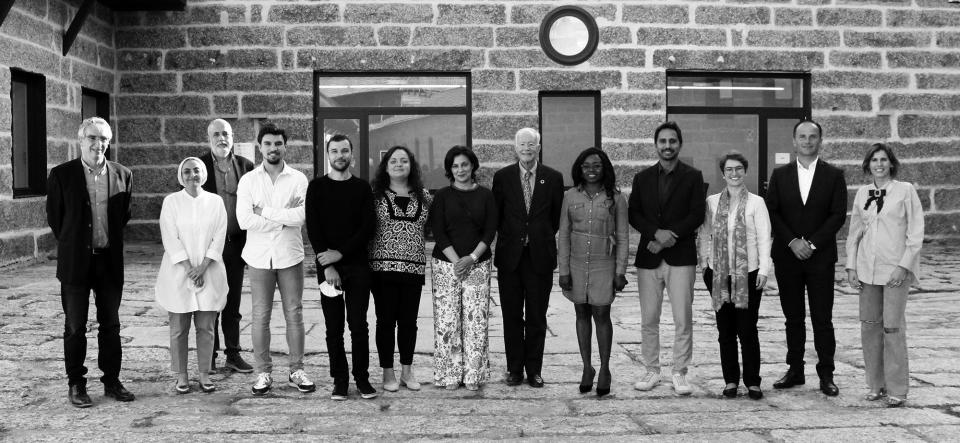The United Nations University is deeply saddened to share the news of the passing of UNU’s sixth Rector, Dr. David M. Malone. Born in Ottawa, Canada on 7 February 1954, Rector Malone was 71.
David Malone enjoyed a distinguished career as a diplomat, academic and international civil servant, holding prominent posts in New York, Cairo, Delhi, Sudan, Libya and Tokyo. A prolific author and widely respected analyst, he leaves behind an exceptional body of work on the United Nations, development, international security, peace processes and Indian foreign policy. He is remembered as a leading voice on international affairs and as a generous mentor who inspired countless young professionals committed to public service and scholarship.
David Malone moved seamlessly between high-level diplomacy and the academic and policy communities. He joined the Canadian diplomatic service at 21, with early postings in Cairo, Sudan and Libya, as well as strategic assignments in Kuwait and Jordan. From 1990 to 1994, he represented Canada at the United Nations in New York, serving as Canada’s Representative to the UN Economic and Social Council and later as Ambassador and Deputy Permanent Representative. He went on to serve as Canada’s Director General for Policy, International Organizations, and Global Issues from 1994 to 1998 and is credited with leading the most recent successful election campaign that resulted in Canada securing a seat on the Security Council, for the 1999–2000 term.
These experiences informed his DPhil (doctorate), written at Oxford under the supervision of Professor Adam Roberts, and his first book, Decision-Making in the UN Security Council: The Case of Haiti (1999). The practice of drawing lessons from his various roles to reach a wider academic and policy audience was something that he would continue through his career.
From 1998 to 2004, David Malone led the International Peace Academy (today the International Peace Institute (IPI)), a New York-based independent research and policy development institution. During his tenure, he turned IPA into the unofficial “salon” of the UN community, bringing together diplomats, researchers and NGOs to discuss critical issues facing the United Nations outside the formal strictures of the UN halls. IPA’s convening role during this period was critical in the development of the Responsibility to Protect concept. The IPA research programme on Economic Agendas in Civil War, and the volume Greed and Grievance (2000) that he co-edited with Mats Berdal on the issue, was hugely influential on UN policy and helped drive the blood diamonds campaign and the refinement of smart sanctions. His IPA book The International Struggle Over Iraq: Politics in the UN Security Council 1980–2005 (2006) was called by the Foreign Affairs review “a fascinating portrait of the changing and often conflicting uses of the Security Council by the major powers.”
If asked about the impact of his work, however, he was known to stress that it was to be seen in the scores of young researchers for whom IPA was the launchpad for careers in diplomacy, the UN, academia and the think tank world.
Dr. Malone returned to government service in 2004 as Assistant Deputy Minister for Global Issues (2004–2006), and from 2006 to 2008 served as Canada’s High Commissioner to India, with cross-accreditation as Ambassador to Nepal and Bhutan. This informed his landmark study of Indian foreign policy, Does the Elephant Dance? Contemporary Indian Foreign Policy (2011).
In 2008, he became President of Canada’s International Development Research Centre (IDRC), where he brought insight, energy and a deep understanding of global issues inspired by his early diplomatic service. He made a significant contribution to understanding and shaping Canada’s role in a rapidly changing world, always with an eye to safeguarding the institution and its ethos.
During his time at IDRC, Dr. Malone initiated and completed a co-edited collection of essays on international development theory and practice, International Development: Ideas, Experience and Prospects (2014). This important contribution to the field of international development is a testament to his intellectual rigor and practicality. The volume stayed on Oxford University Press’s “most recommended” list for many years, and its papers continue to be cited today.
In 2013, UN Secretary-General Ban Ki-Moon appointed David Malone to the position of United Nations University Rector, holding the rank of United Nations Under-Secretary-General. He was a transformative leader who streamlined UNU’s governance practices, helping to make the institution more nimble and efficient. Over the course of his two terms (2013–2018, 2018–2023), he also advanced an ambitious gender equity initiative that closed substantial parity gaps within the UNU workforce.
One of Rector Malone’s most significant legacies at UNU is the strategic shift he championed toward policy research with practical impact for the world. In response to direct appeals from the Secretary-General, he established the United Nations University Centre for Policy Research, a unit (with offices in New York and Geneva) dedicated to supporting major multilateral negotiations and institutional reforms of concern to the Secretary-General and Member States.
While serving as UNU Rector, David Malone continued to be a prolific public intellectual, presenting his writing and ideas at meetings in Japan and abroad. He deepened public awareness of global issues in Japan through a wide-ranging public Conversation Series that significantly expanded UNU’s engagement with its host nation community and strengthened understanding of the United Nations and its work. He was awarded the Grand Cordon of the Order of the Rising Sun by the Government of Japan in 2023 — one of the highest decorations given by the Japanese Government — for his outstanding contribution to strengthening the relationship with Japan and advancing academic research.
Over the course of his extensive career, David Malone also held research posts at the Brookings Institution; Massey College, University of Toronto; and the Norman Paterson School of International Affairs, Carleton University. He was Guest Scholar and Adjunct Professor at Columbia University, and an Adjunct Professor and Senior Fellow at the New York University School of Law, where he co-taught, with the legendary Thomas Franck, the highly popular class on “The Law and Practice of the United Nations”, which formed the basis of yet another book that remains in print. In addition to his Oxford doctorate, he held a degree from l’École des Hautes Études Commerciales (Montreal) and an MPA from Harvard’s Kennedy School of Government. He also studied at the American University of Cairo.
David Malone was widely admired for his energy, curiosity and sharp intellect — qualities that defined his career and endeared him to so many. He leaves a legacy of impactful service and insightful writing, but also the many young people he inspired to serve in embassies, international organizations, universities and think tanks around the world. We mourn an astute practitioner of the diplomatic arts and an intellectual with a deft pen who spoke with courage.
A condolences book will be available to sign in New York at the UNU Centre for Policy Research (767 3rd Ave, 35F, between 47th and 48th streets) at the following times:
- Monday, 1 December, 1:30pm to 3:30pm
- Tuesday, 2 December 1:30pm to 3:30pm
- Wednesday, 3 December 1:30pm to 3:30pm
If you would like to sign, please write to Christina McElwaine (mcelwaine@unu.edu ) in advance of your visit.
A condolences book will be available to sign at the United Nations University Headquarters in Tokyo (5 Chome-53-70 Jingumae) at the following times:
- Monday, 1 December, 9:30am to 5:30pm
- Tuesday, 2 December 9:30am to 5:30pm
- Wednesday, 3 December 9:30am to 5:30pm
Persons not in New York or Tokyo may send condolences via email to unu.ro@unu.edu

UNU-EGOV will be forever grateful to Dr. David Malone
We are deeply saddened to share the news of the passing of Dr. David M. Malone, the sixth Rector of the United Nations University, on 24 November 2025.
Rector Malone played a pivotal and foundational role in establishing the United Nations University – Operating Unit on Policy-Driven Electronic Governance (UNU-EGOV) in Portugal. He championed its creation and steadfastly supported its development from the very beginning, in close and valued cooperation with the Portuguese Republic.
His vision, leadership, and unwavering commitment were instrumental in bringing the Operating Unit to Guimarães, Portugal, and in guiding its successful growth.
We thank you for keeping Rector Malone in your thoughts as we honour his remarkable contributions to the United Nations University and to Portugal’s long-standing partnership with the United Nations. As a mark of respect, the United Nations flag at the UNU-EGOV building in Guimarães will be flown at half-mast throughout the coming week.


